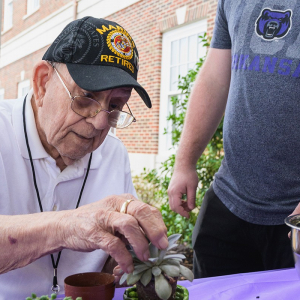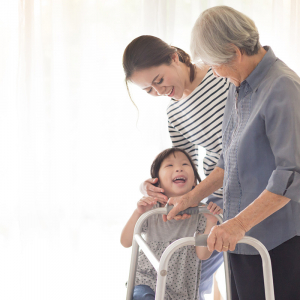Standing up to Alzheimer’s

The onset of old age doesn’t have to mean the onset of Alzheimer’s disease or dementia.
While many may think such afflictions are luck-of-the-draw or come with the territory of advanced years, these particular losses of mental faculties are far from inevitable, said Dr. Jeanne Wei, executive director at the Reynolds Institute of Aging at UAMS.
Wei noted that between one- and two-thirds of Alzheimer’s and dementias can, if not prevented, be delayed through personal health measures. Everyone must face the inevitable end of life, but preventive measures can possibly allow us to live out our days without being affected by dementia-related brain dysfunction.
“If I can delay that until I’m 120, I might not show it,” Wei said.
According to Arkansas Alzheimer’s Association figures, the number of Arkansans 65 and older affected by Alzheimer’s is projected to increase from 58,000 in 2020 to 67,000 by 2025, a 15.5% jump. While a small number of people may be genetically predisposed, the cumulative effect of brain traumas and undetected minor strokes throughout one’s life can also lead to the onset of dementia.
That is not to be mistaken for normal, cognitive aging, Wei said.
“When we get older, we get more easily distracted. You know it, and I know it,” Wei said.
The ability to multitask, the time it takes to process information, short-term memory and visual/spatial abilities are affected by normal aging, Wei said, while the upside is that verbal ability increases with age.
On the other hand, difficulty with communication and daily tasks, repeating the same things, getting lost in familiar surroundings, personality changes, losing track of the date and time, and a decline in regular behaviors like bathing are warning signs of dementia onset.
“There’s a cumulative effect of all the injuries that we sustained during the lifetime,” Wei said, “so that by the time we’re 65, we have some damage that has accumulated, so our margin is not as good as when we’re 25.”
Taking care of the body, Wei said, helps take care of the mind. Diabetes, high blood pressure and high cholesterol can create an environment in which dementia can take hold.
But the good news, Wei said, is there are several things your loved ones can do. A good diet and exercise, activities that challenge the brain, social life and companionship can all factor into better overall health and contribute to making a loved one’s later years dementia-free.
Sources: UAMS Centers on Aging, Alzheimer’s Arkansas, Alzheimer’s Association, cdc.gov.

Fighting Back
Tips and advice to help stave off the onset of Alzheimer’s disease and dementia
General
Getting the proper amount of sleep and avoiding head traumas, alcohol, smoking and even pollution exposure can help fight off dementia.
Talk
Having someone who cares and will actively listen can help one avoid isolation, activate the mind and create a beneficial sense of well-being.
Eat
Important foods for fighting dementia include fruits and vegetables, foods low in fat and carbohydrates and high in antioxidants, vitamins and proteins.
“If we can do all those things, we’re going to be fantastic,” Wei said.
Think
Challenge the brain through reading, singing or playing a musical instrument, learning new skills like photography, arts and crafts like needlepoint, and indulging in brain teasers like crosswords, puzzles, sudoku, video games, checkers and chess.
Move
Staying active is one of the best ways to fight the onset of dementia. With a physician’s approval, dancing, walking or running, pickleball, yoga and chair yoga, tai chi, walking the dog and online exercise classes are all viable, preventive options a loved one can try.
Source: homecareassistance.com

Seek Support
Close to 60,000 Arkansans live with Alzheimer’s, with caregivers providing 140 million hours of unpaid care.
Caregiver support and counseling are available no matter what region of the state you call home.
Alzheimer’s Arkansas offers a 24-hour support hotline for caregivers and support groups that meet statewide. UAMS, through the Walker Memory Center, can help identify causes of memory loss and necessary steps for treatment. UAMS also offers one-on-one caregiver training for Arkansans struggling to care for loved ones with dementia and other memory-related illnesses.
Caring for yourself is critical when caring for someone else becomes your responsibility.








